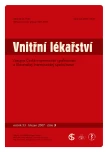-
Medical journals
- Career
Acute humoral rejection of renal transplant
Authors: J. Slatinská 1; E. Honsová 2; L. Lyerová 1; A. Slavčev 3; O. Viklický 1
Authors‘ workplace: Klinika nefrologie, Transplantační centrum Institutu klinické a experimentální medicíny, Praha, přednosta prof. MUDr. Vladimír Teplan, DrSc. 1; Oddělení klinické a transplantační patologie Institutu klinické a experimentální medicíny, Praha, přednostka prim. Eva Honsová 2; Imunologické pracoviště Institutu klinické a experimentální medicíny, Praha, přednosta doc. MUDr. Ilja Stříž, CSc. 3
Published in: Vnitř Lék 2007; 53(3): 246-252
Category: Original Contributions
Overview
Acute humoral rejection (AHR) is a rare complication which often results in the loss of kidney graft. The objective of this retrospective monocentric study was to evaluate two different approaches to AHR. Documentation of 730 patients was analysed, who underwent renal transplantation between 2002 and 2005. From 2002 to 2003, patients with AHR were treated with 5 plasmaphereses (PF group, n = 13), and from 2004 to 2005 with a combination of 5 PF and intravenous immunoglobulins (PF + IVIG, 0.5 g/kg, n = 8). Data for the period of one year post-transplant was analysed. AHR occurred in 21 out of 730 patients (2.9 %). Survival of grafts in the 6th month and in the 1st year was significantly higher for the PF + IVIG group than for the PF group only (p < 0.05). Patient survival was similar in both groups. The incidence of infectious complications was similar in both groups. There was a higher incidence of acute cellular rejections in the PF group (46.2 vs. 14.3 %) in control rebiopsies (performed due to deteriorated graft function or in order to check the efficiency of the treatment). It can be concluded that acute humoral rejection of transplanted kidney is a rare complication which can be treated by the combination of plasmaphereses and intravenous immunoglobulins.
Key words:
kidney transplant – humoral rejection – treatment – plasmaferesis
Sources
1. Feucht HE, Schneeberger H, Hillebrand G et al. Capillary deposition of C4d complement fragment and early renal graft loss. Kidney Int 1993; 43 : 1333-1348.
2. Feucht HE Complement C4d in graft capillaries-the missing link in the recognition of humoral alloreactivity. Am J Transplant 2003; 3 : 646-652.
3. Connie L, Davis MD Core curriculum in nephrology, transplant immunology and treatment of rejection. Am J Kidney Dis 2004; 43 : 1116-1134.
4. Halloran PF, Waldygmar A, Ritchie S et al. The significance of the anti-class I antipody responseI. Clinical and pathologic features of anti-class I-mediated rejection. Transplantation 1990; 49 : 85-91.
5. Halloran PF, Schlaut J, Solez K et al. The significance of the anti-class I antibody response. II. Clinical and pathologic features of renal transplants with antibody. Transplantation 1992; 53 : 550-555.
6. Mauiyyedi S, Colvin RB Humoral rejection in kidney transplantation: new concepts in diagnosis and treatment. Curr Opin Nephrol Hypertens 2002; 11 : 609-618.
7. Mauiyyedi S, Crespo M, Collins AB et al. Acute humoral rejection in kidney transplantation: II. Morphology, immunopathology, and pathologic classification. J Am Soc Nephrol 2002; 13 : 779-787.
8. Sun Q, Liu ZH, Ji S et al. Late and early C4d-positive acute rejection: Different clinico-histopathological subentities in renal transplantation. Kidney Int 2006; 70 : 377-383.
9. Racusen LC, Solez K, Colvin RB et al. The Banff 97 working classification of renal allograft pathology. Kidney Int 1999; 55 : 713-723.
10. Racusen LC, Halloran PF, Solez K Banff 2003 meeting report: new diagnostic insights and standards. Am J Transplant. 2004; 4 : 1562-1566.
11. Lehrich RW, Rocha PN, Reinsmoen N et al. Intravenous immunoglobulin and plasmapheresis in acute humortal rejection: experience in renal allograft transplantation. Hum Immunol 2005; 66 : 350-358.
12. Rocha PN, Butterfly DW, Greenberg A et al. Beneficia effect of plasmapheresis and intravenous immunoglobulin on renal allograft of patients with acute rejection. Transplantation 2003; 75 : 1490-1495.
13. Ibernon M, Gil-Vernet S, Carrera M et al. Therapy with plasmapheresis and intravenous immunoglobulin for acute humoral rejection in kidney transplantation. Transplant Proc 2005; 37 : 3743-3745.
14. White NB, Greenstein SM, Cantafio AW et al. Successful rescue therapy with plasmapheresis and intravenous immunoglobulin for acute humoral renal transplant rejection. Transplantation 2004; 78 : 772-774.
15. Jordan S, Cunningham-Rundles Ch, McEwan R Utility of Intravenous Immune Globulin in Kidney Transplantation: Effucacy, Safety, and Cost Implication. Am J Transplant 2003; 3 : 653-664.
16. Montgomery RA, Zachary AA, Racusen LC et al. Plasmapheresis and intravenous immune globulin provides effective rescue therapy for refractory humoral rejection and allows kidneys to be successfully transplanted into cross-match-positive recipients. Transplantation 2000; 70 : 887-895.
Labels
Diabetology Endocrinology Internal medicine
Article was published inInternal Medicine

2007 Issue 3-
All articles in this issue
- Infection and atherosclerosis
- Effectiveness of anti-resorption therapies of postmenopausal osteoporosis
- Hashimoto’s encepahlopthy – a rare and unusual syndrome
- Detection of ectopic gastric mucosa in Meckel’s diverticulum by means of scintigraphy with 99mTc-pertechnetate in a 24-year old man
- Catheter ablation of chronic atrial fibrillation using circumferential and complex linear lesions in the left atrium: modes of arrhythmia termination and long-term clinical outcome
- Cognitive dysfunction in patients with systemic lupus erythemathosus with or without antiphospholipid antibodies
- Acute humoral rejection of renal transplant
- Systemic and paraneoplastic manifestations of malignant diseases
- Internal Medicine
- Journal archive
- Current issue
- Online only
- About the journal
Most read in this issue- Systemic and paraneoplastic manifestations of malignant diseases
- Hashimoto’s encepahlopthy – a rare and unusual syndrome
- Acute humoral rejection of renal transplant
- Detection of ectopic gastric mucosa in Meckel’s diverticulum by means of scintigraphy with 99mTc-pertechnetate in a 24-year old man
Login#ADS_BOTTOM_SCRIPTS#Forgotten passwordEnter the email address that you registered with. We will send you instructions on how to set a new password.
- Career

